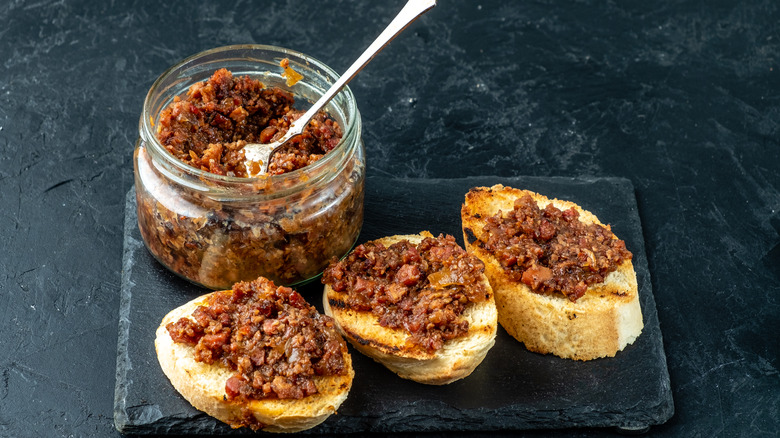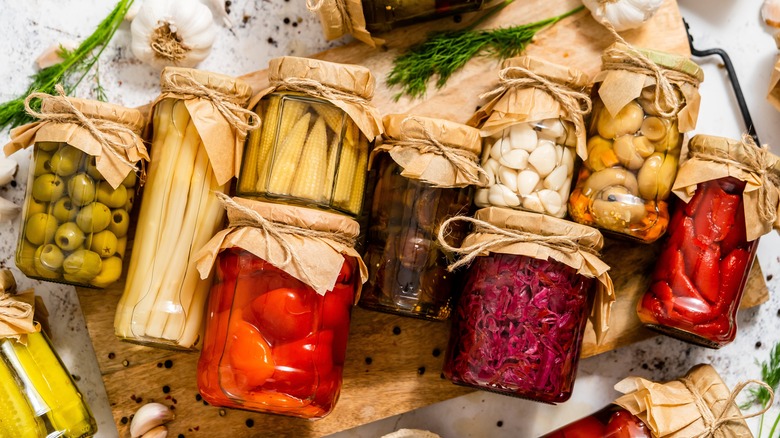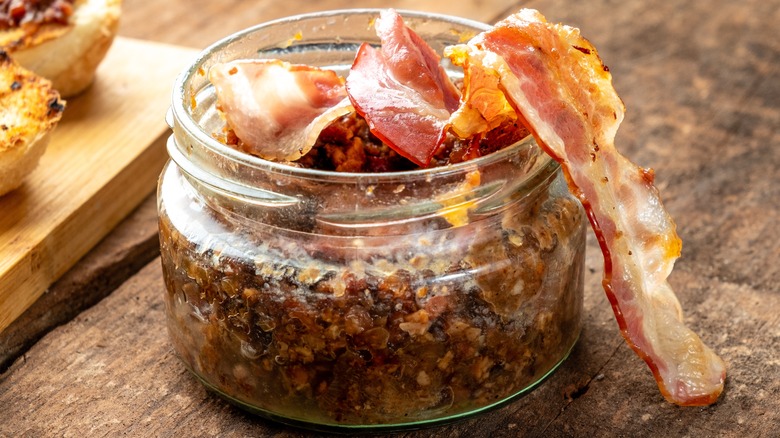The Food Safety Reason You Never Should Can Bacon Jam
Canning food is a fantastic way to store the bounty of the season. Invented in France in 1809, it has historically allowed nations to feed their armies on the go and extend summer produce into the cold winter months, long before refrigeration was a thing. Today, it's a fun way for DIY-ers to make jams, jellies, and other preserves last for years without refrigeration. But one favorite home recipe that should never be canned is bacon jam.
Bacon jam can be used for a sweet and smoky salad dressing, or to unlock a whole new flavor in grilled cheese. And it's so easy to make, that if you know how to cook bacon, you're just a couple extra steps away from the ultimate condiment. But if incorrectly stored, bacon jam can become a breeding ground for salmonella, listeria, or even botulism. It is made to be refrigerated for up to four weeks, or frozen for several months (unless you plan to eat it immediately). But it absolutely should not be stored at room temperature, or treated like a shelf-stable jar of preserves.
How does canning work?
The process of canning food involves heating it to a high temperature and then sealing it in jars or metal tins. Heating it kills bacteria, and sealing it protects it from contamination. Traditionally, pre-sterilized jars are filled with your preserves and capped with a two-part lid (leaving some headspace), then boiled in a water bath to allow the remaining air to be pushed out of the jar by the heat. Once left to cool, the lid will pop closed to signify that it has properly sealed. If done properly, your items will be shelf-stable. If not, you run the risk of infection.
A bacon jam recipe typically contains bacon, onion, garlic, sugar, and balsamic vinegar. It is made by cooking bacon on its own, reserving some of the bacon grease, and then adding the other ingredients and allowing the mixture to cook down until syrupy. Some recipes call for more vinegar or sugar, both of which can be used to preserve food. Sugar does this by absorbing water, which microorganisms need to thrive. Vinegar does this by lowering the pH of the ingredients it is added to, which creates a hostile environment for bacteria.
How fat and acid play into canning
But even if you follow all the rules, the wrong ingredients can pose a major safety concern when canning. So what is in bacon jam that is such a problem?
Canning is generally reserved for high-acid foods like fruits, because botulism, or Clostridium botulinum, can grow in any pH above 4.6, and requires an acidic environment to suppress it. But garlic and onions both have a higher pH, meaning they are less acidic, so they are not ideal candidates for canning ... both for safety reasons and because it can cause them to lose flavor. They are, however, ideal for pickling, as the added vinegar helps lower the overall pH. Add in bacon (another low-acid food), and you've got a mixture that goes counter to the established safety regulations for canning.
One of the main issues with canning bacon jam, however, doesn't have to do with alliums or the meat itself, but the fat. Fat can insulate bacteria during the canning process, allowing it to survive even at high temperatures. It can also prevent the can from sealing properly, and even if it does, it is likely to go rancid in a short amount of time. So don't take a risk when enjoying your favorite sweet-savory spread — leave your bacon jam in the fridge, and no one gets hurt.



